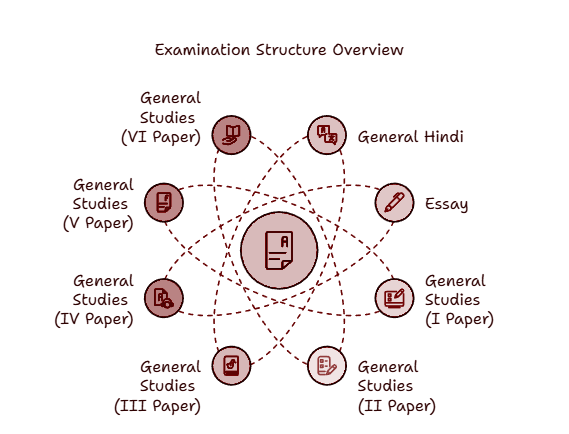Uttar Pradesh
UPPCS Syllabus - Mains
- 06 Jan 2025
- 16 min read
The Uttar Pradesh Public Service Commission (UPPCS) Mains Examination is designed to evaluate candidates' depth of knowledge across diverse subjects, analytical skills, and ability to articulate coherent answers. The syllabus is divided into various components, including language proficiency, essay writing, and General Studies Papers (I to VI), each focusing on distinct thematic areas.
A detailed breakdown of the Mains syllabus is discussed in the following content.
- सामान्य हिंदी
- दिये गए गद्य खण्ड का अवबोध एवं प्रश्नोत्तर।
- संक्षेपण।
- सरकारी एवं अर्धसरकारी पत्र लेखन, तार लेखन, कार्यालय आदेश, अधिसूचना, परिपत्र।
- शब्द ज्ञान एवं प्रयोग।
- उपसर्ग एवं प्रत्यय प्रयोग
- विलोम शब्द
- वाक्यांश के लिए एकशब्द
- वर्तनी एवं वाक्य शुद्धि
- लोकोक्ति एवं मुहावरे।
Essay
- There will be three sections in the question paper of the Essay. Candidates will have to select one topic from each section and they are required to write an essay in 700 words on each topic.
- In the three sections, the topics of the essay will be based on the following spheres:
|
Section |
Topics |
|
Section A |
|
|
Section B |
|
|
Section C |
|
General Studies-I
| Topic | Details |
| History of Indian Culture |
|
| Modern Indian History |
|
| The Freedom Struggle |
|
| Post-Independence History |
|
| World History |
|
|
Indian Society and Culture |
|
| Role of Women and Related Issues |
|
| Economic Reforms and Impact |
|
| Social Issues |
|
| Natural Resource Distribution |
|
| Physical Geography |
|
| Oceanic Resources of India |
|
| Human Migration |
|
| Indian Sub-Continental Boundaries |
|
| Population and Settlements |
|
General Studies-II
| Topic | Details |
| Indian Constitution |
|
| Union and State Functions |
|
| Finance Commission |
|
| Separation of Powers |
|
|
Comparison of Constitutional Schemes |
|
| Parliament and State Legislatures |
|
| Executive and Judiciary |
|
| Representation of People’s Act |
|
| Statutory, Regulatory, and Quasi-Judicial Bodies |
|
| Government Policies and Interventions |
|
| Development Processes |
|
| Welfare Schemes |
|
| Social Sector/Services |
|
| Poverty and Hunger |
|
| Governance |
|
| Civil Services |
|
| India and Neighbouring Countries |
|
| Bilateral, Regional, and Global Groupings |
|
| Global Policies and Politics |
|
| International Institutions and Agencies |
|
| Current Affairs |
|
General Studies-III
| Topic | Details |
| Economic Planning in India |
|
| Poverty and Unemployment |
|
| Government Budgets and Financial System |
|
| Agriculture |
|
| Farm Subsidies and Food Security |
|
| Food Processing Industries |
|
| Land Reforms |
|
| Liberalization and Globalization |
|
| Infrastructure |
|
| Science and Technology |
|
| Indigenization and Technology Transfer |
|
| Information and Communication Technology (ICT) |
|
| Environmental Security and Ecosystems |
|
| Disaster Management |
|
| International Security Challenges |
|
| India's Internal Security Challenges |
|
| Security Forces and Defence Organizations |
|
| Agriculture and Allied Fields |
|
General Studies-IV
| Topic | Details |
| Ethics and Human Interface |
|
| Attitude |
|
| Aptitude and Foundational Values for Civil Service |
|
| Emotional Intelligence (EI) |
|
| Moral Thinkers and Philosophers |
|
| Public/Civil Service Values and Ethics in Public Administration |
|
| Probity in Governance |
|
| Case Studies |
|
General Studies-V
| Topic | Details |
| History, Civilization, Culture, and Ancient Cities of UP |
|
| Architecture of UP |
|
| Freedom Struggles |
|
| Eminent Personalities |
|
| Rural, Urban, and Tribal Issues |
|
| Political System of UP |
|
| Public Service |
|
| State Selection Criteria |
|
| Local Self-Government |
|
| Good Governance |
|
| Land Reforms |
|
| Security Issues in UP |
|
| Law and Order and Civil Defense |
|
| Medical and Health Issues |
|
| Education System |
|
| Development Contribution |
|
| Current Affairs of UP |
|
| Welfare Schemes |
|
| NGOs in UP |
|
|
Tourism in UP |
|
| Innovation in UP |
|
General Studies-VI
| Topic | Description |
| Overview of Economy of UP |
|
| Trade, Commerce and Industries of UP |
|
| UP Government Schemes and Projects |
|
| Investment in UP |
|
| Public Finance and Fiscal Policy |
|
| Renewable and Non-Renewable Energy Resources |
|
| Demography and Population |
|
| Agricultural Commercialization |
|
| UP New Forest Policy |
|
| Agro and Social Forestry in UP |
|
| Agricultural Diversity and Problems |
|
| Developmental Indices of UP |
|
| Geography of UP |
|
| National Parks and Wildlife Sanctuaries |
|
| Transport Network in UP |
|
| Power Resources and Industrial Development |
|
| Pollution and Environmental Issues in UP |
|
| Natural Resources of UP |
|
| Climate Change and Weather Forecasting |
|
| Habitat and Ecosystem |
|
| Science and Technology |
|
| Aquaculture, Viticulture, Sericulture, Floriculture, Horticulture, Arboriculture in UP |
|
| Public-Private Partnership (PPP) |
|





